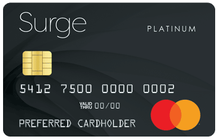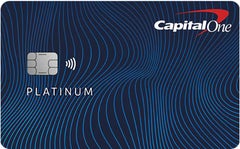Surge® Platinum Mastercard® review: Excessive fees for a credit-building card
The card’s high fees could push you to look for better credit-building options.
The Bankrate promise
At Bankrate we strive to help you make smarter financial decisions. While we adhere to strict , this post may contain references to products from our partners. Here's an explanation for .
Snapshot
2.5
Bottom line
The Surge® Platinum Mastercard® can be an effective tool for getting a decent credit limit without a security deposit and a chance at a credit limit increase with responsible use. But the card’s high fees and APR make it a questionable choice for most credit-builders.
Intro offer
N/A
Annual fee
$75 - $125
Regular APR
35.90% Fixed
2.5
Bankrate score
Cost of membership
Ease of building credit
APR
Features
Card Details
Remove a card to add another to compare
Remove a card to add another to compare
The Surge Mastercard overview
The Surge Platinum Mastercard, issued by Celtic Bank, is for people with a bad credit history or none at all who want to build or rebuild their credit without tying money up in a hefty security deposit.
The card has some convenient credit-building features, like payment plans, but it comes with a significant annual fee and a stack of other fees that could make it more expensive than other credit-building cards. A few unsecured credit cards feature lower fees, and several of the best secured cards even offer rewards and other credit-building perks.
-
Rewards
- This card doesn’t offer rewards, which is typical of secured credit cards
Expert Appraisal: Weak
See our expert analysis -
Rates and fees
- Annual fee: $75 to $125
- Monthly maintenance fee: For those with a credit limit of $300 or $500: $0 introductory fee for the first year, then $150 thereafter (billed as $12.50 per month).
- Purchase Intro APR: N/A
- Balance Transfer Intro APR: N/A
- Regular APR: 35.90% Fixed
- Foreign transaction fee: For those with a credit limit of $300 or $500: $0 introductory fee for the first year, then 3 percent of each transaction in U.S. dollars. For those with a credit limit of $750 or $1,000: 3 percent of each transaction in U.S. dollars from the date your account is opened.
- Premium card fee: $9.95
- Expedited service fee: Undisclosed
Expert Appraisal: Weak
See our expert analysis -
Credit-building features
- Reports card use to all three major credit bureaus
- Fast prequalification process
- Credit limit increase possible with responsible use
Expert Appraisal: Good
See our expert analysis -
Other cardholder perks
- Mastercard zero liability fraud protection
Expert Appraisal: Unimpressive
See our expert analysis
Surge Mastercard pros and cons
Pros
-
It reports to all three credit bureaus, which is important for building or repairing credit.
-
It comes with a credit limit of $300 to $1,000 with no security deposit requirements.
-
You may be able to double your credit limit after showing responsible card use, which helps your credit utilization ratio.
Cons
-
Its high annual fee and potential monthly maintenance fees make it more costly than many other credit-building cards.
-
The variable APR is among the highest on the market — equal to many penalty APRs.
-
This card is light on perks and protections compared to other secured and unsecured credit-building cards.
How to build credit with the Surge Mastercard
You can build credit with the Surge Mastercard the same way you can build credit with other cards — through responsible use. That means:
- Paying your bills on time every month. Paying your bills on time — and preferably in full — is the single most important thing you can do to build your credit score. Positive payment history signals to lenders that you’re a trustworthy borrower and raises your credit score.
- Keeping an eye on your credit utilization. Your Surge Mastercard might not have a very high credit limit when you first get it, so you want to make sure you don’t go overboard on your credit utilization, or the amount of credit you’re using compared to your total available credit. In general, try to use no more than 30 percent of your available credit at any given time.
- Checking your credit reports periodically. This can help you make sure your credit information is accurate and catch any errors that may occur.
The Surge Mastercard also offers some credit-building features that can help you jumpstart your journey, such as a potential credit limit increase with responsible use. It also reports to all three credit bureaus.
Why you might want the Surge Mastercard
The Surge Mastercard isn’t the strongest pick on the market if you want to build credit. However, it does have a few features that make it worth a look.
Starting credit limit: Potentially high for a credit-building card
Depending on your credit score and financial history, you may qualify for a starting credit limit as high as $1,000. This is a respectable starting credit limit for an unsecured credit-building card, as most cards offer credit limits as low as a few hundred dollars.
You also have the opportunity to increase your credit limit by up to $2,000 with responsible use. Although some secured cards could provide a higher maximum credit limit (typically up to $2,500, but some outliers offer up to a $5,000 limit), you usually need to deposit funds equal to the credit limit you want. The Surge Mastercard’s limit increase could help keep your credit utilization ratio low.
Your credit utilization ratio is a percentage of how much of your available credit you’re using and makes up 30 percent of your FICO credit score. If you have a $1,000 credit limit among all your credit cards and a total $400 balance, then your credit utilization ratio is 40 percent. We recommend keeping your ratio less than 30 percent. You can use a credit utilization ratio calculator to help you determine how much of your available credit you’re using.
Application: Prequalify quickly with no security deposit required
The Surge Mastercard’s other main strength is how simple it is to apply. You can prequalify online and begin the application process within minutes. You also don’t need to provide a security deposit because it’s an unsecured credit-building card.
These features aren’t revolutionary, but they are helpful if you have a history of poor credit as they remove some of the barriers — like security deposit and hard credit check — that may prevent you from applying for a credit-building card in the first place.
Credit-building features: Makes tracking credit score progress easier
While the Surge Mastercard reports credit usage to the three major credit bureaus, it goes a few steps further to make your credit-building journey a bit easier. For instance, you will have the opportunity to have a credit limit increase with responsible use.
Why you might want a different credit-building card
A few sore points ultimately hamper the Surge Mastercard’s usefulness as a credit-building card.
Rates and fees: Excessive monthly and yearly costs
The Surge Mastercard is yet another credit-building card that charges far too many fees for comfort. While it’s not the worst offender we’ve seen, the card’s $75 to $125 annual fee for the first year (then $99 to $125) and potential monthly fee are expenses you don’t want to — and shouldn’t have to — worry about when you’re trying to build credit. This card’s annual percentage rate (APR) is also quite high. Although high APRs are typical of credit-building cards, the Surge Platinum Mastercard poses one of the steepest APRs around — on par with the typical penalty APR for missing payments.
There are also a few optional one-time fees you may run across. These include a $30 fee for an authorized user’s card and a $9.95 “premium card fee” if you want a different card design. You’ll also be subject to a 3 percent foreign transaction fee for international purchases ($0 fee for the first year if you have a credit limit below $500), as well as late and returned payment penalty fees of up to $41.
If you ever call customer service to make a same-day payment, or if the payment needs to be processed after 5 p.m. or on a non-business day, there’s also an undisclosed “expedited service fee” that the customer service representative will inform you of.
Cardholder perks: Bare-minimum benefits
Other than the credit-building features, the Surge Mastercard has no real cardholder benefits to speak of. As a Mastercard, it comes with Mastercard’s zero fraud liability protection, which is a standard protection many cards have.
A plethora of perks and benefits is uncommon on many credit cards for people with bad or no credit, so it’s unsurprising to see limited perks with the Surge Mastercard.
Rewards: No incentives on your spending
The Surge Mastercard doesn’t come with any rewards or cash back offers. This isn’t totally out of the ordinary for a credit-building card, but a surprising number of similar cards on the market offer rewards on card purchases. For example, the Discover it® Secured Credit Card offers a flat cash back rate on all purchases and an elevated rate on select purchases.
Earning rewards on your card use can sweeten the credit-building process and compensate for the relatively low spending power credit-building cards tend to offer. However, all the fees that the Surge Mastercard charges would probably eat into any rewards you accumulate anyway.
How the Surge Mastercard compares to other credit-building cards
If you’re looking for an effective credit card to build credit, the Surge Mastercard may be worth considering if you want to avoid secured cards. But given the card’s costly fees, you may be better off with other options.

Annual fee
Intro offer
Rewards rate
Recommended Credit Score
A FICO score/credit score is used to represent the creditworthiness of a person and may be one indicator to the credit type you are eligible for. However, credit score alone does not guarantee or imply approval for any financial product.

Annual fee
Intro offer
Rewards rate
Earn up to 10% cash back on everyday purchases.
Recommended Credit Score
A FICO score/credit score is used to represent the creditworthiness of a person and may be one indicator to the credit type you are eligible for. However, credit score alone does not guarantee or imply approval for any financial product.

Annual fee
Intro offer
Rewards rate
Recommended Credit Score
A FICO score/credit score is used to represent the creditworthiness of a person and may be one indicator to the credit type you are eligible for. However, credit score alone does not guarantee or imply approval for any financial product.
Is the Surge Platinum Mastercard right for me?
The Surge Mastercard can help you build credit with responsible usage. Although it has a high annual fee and significant maintenance fees, it can provide you with a decent credit limit that can help you keep your credit utilization ratio low. With that in mind, this card might be a good choice for you if:
- You don’t want to put down a security deposit. The Surge Mastercard is unsecured, so you won’t need a security deposit to open it. Just keep an eye on the ongoing costs of using the card, because those costs will likely exceed a standard security deposit amount eventually.
- You have poor credit. Poor credit makes you less likely to qualify for some of the stronger credit-building cards on the market.
However, if you can qualify for a card with a lower annual fee or have the funds to contribute to a refundable security deposit, you may want to consider a lower-cost secured credit card or an unsecured card with better perks.
Alternative picks
The Surge Mastercard might save you from needing a security deposit, but it doesn’t come with many other benefits. For a card that’s more rewarding and potentially less costly when used responsibly, consider these alternatives:
Frequently asked questions about the Surge Mastercard
How we rated this card
Our proprietary card rating system takes into account a mix of factors when scoring credit cards for students and people building credit, including each card’s cost, APR, credit-building tools and more.
We analyzed over 50 of the most popular cards designed for students and people with no credit history, bad credit or a fair credit score and scored each based on where its key features stood in relation to others in its category.
Here are some of the key factors that gave this card its score:
* See the online application for details about terms and conditions for these offers. Every reasonable effort has been made to maintain accurate information. However all credit card information is presented without warranty. After you click on the offer you desire you will be directed to the credit card issuer's web site where you can review the terms and conditions for your selected offer.
Editorial Disclosure: Opinions expressed here are the author's alone, and have not been reviewed or approved by any advertiser. The information, including card rates and fees, is accurate as of the publish date. All products or services are presented without warranty. Check the bank’s website for the most current information.












